27 Creatives Answer: How is making art healing/ cathartic/ therapeutic for you?
Many people say "art is therapy" but what exactly do people mean by that? Here are some incredible responses.
I work with artists/writers/creatives to help them understand the relationship of health to creativity in their own lives in order to achieve holistic wellness and success.
In writing about the complex relationship between art and psychology, I am most interested in the nuances and shadows. I’m interested in the complexities, the ways in which our various symptoms and thoughts impact our creativity, the ways in which our creativity sometimes complicates our mental health. That said, I also deeply believe in the healing power of art and sometimes it’s good just to celebrate those positive things. So, here’s a roundup of interview responses (with links to the full interviews) from 27 people who answered:
How is making art healing/ cathartic/ therapeutic for you?
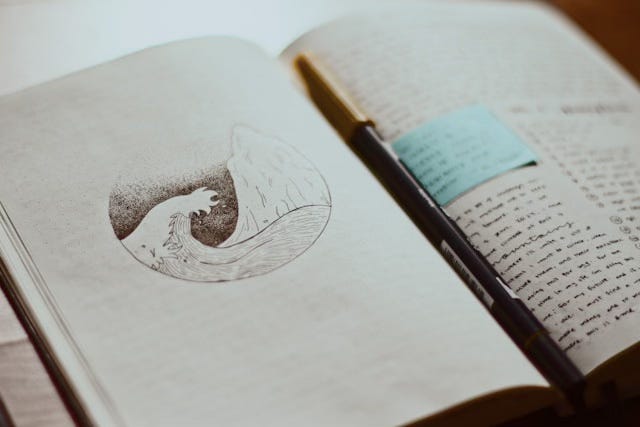
Bunni said:
“I used to deal a lot with self harming. When dealing with mental struggles alone, such a thing results a lot. Exploring the art world and drawing and creating my own style has allowed me to feel like there’s something real that I can hold onto. This is because it allows me to not only bring in these ideas that I have of how I would like to be seen, but I can also make my stand alone characters and pieces have their own stories and make them created to be their own representations of emotions.”
Alex Yalen of
said:“Art has helped me because it is an outlet to go where my mind needs to go. I really do feel that art uses me as much as I use it. I don't ever sit down and say, "I'm going to use my writing as therapy." I find that the key thing is for me to have no expectations about what my writing will look like or pull out of me. I need to find unstructured time and let my mind go, and that's when the therapeutic element kicks in on its own. I sometimes say it feels like "playing pretend" because I am an only child and I was a latchkey kid and a lonely latchkey kid at that. I spent many, many hours entertaining myself... and when my art is really "flowing," there is a similar feeling, like I'm playing a game internally.”
“Creating has been very therapeutic for me. It helps me connect with myself. When I was dealing with anxiety on a daily basis, I lost touch with who I was at my core. Creating is also a form of self-expression. My writing helps with my mental health as I sift through experiences and events that can cause or feed anxiety. Giving voice to these issues is incredibly healing for me and hopefully for others as well. The biggest benefit of creating is the joy I feel. I’m learning that joy is the panacea to fear, so the more I create, the more joy I feel, helping to edge out fear.”
“It is not hyperbole that art has saved my life, time and time again. I had a difficult childhood - especially my adolescence - and if not for theater I might not be here today. It has given me hope and community. It gave me a healthy outlet and kept me out of trouble.”
The biggest takeaway I have from completing the memoir is that the process assisted me in understanding what was done to me, that it wasn't my fault, that I'm not the crazy one (not for that reason anyway) and also in noticing the ways in which what happened still affects me, allowing me to work on changing my kneejerk reactions and finally standing up for my self and my worth. The personal essay as healing journal is pretty straightforward and quite true. What might be less obvious is my time in the combat arts—fighting as therapy. That has been quite, quite healing for me, in a few ways I’ve written about before.
“I feel great after having written. It's like giving birth. I feel hopeful.”
“I really came to understand the importance of art in my life during covid when I needed a respite and needed to express myself. Creativity is a way of life for me and how I interact with the world--- it's one of curiosity, play, meaning making, a beholder of reality and truth-telling. It helps me process my emotions, it helps me express what's true for me in a moment or a season, it helps me regulate my body/emotions and connect with myself, it helps me process hard things. I get a lot of benefits knowing I may have helped someone feel seen or not feel alone/isolated with their feeling or experiences. It also provides a lot of joy and fun for me which is really important to my needs as a person.”
“I'm much calmer and happier after a good studio session. Just me, alone with my projects and materials. It's really comforting.”
“Art, whether it's visual or auditory or verbal, has always helped me see myself—and see into myself—better. But the greatest epiphanies have come when I work to express myself, when I try to communicate what I want to say through art. I don't know who said this first, but I'll repeat it here: A poem is an egg with a dragon inside. I hope my fiction has at least some aspect of that phenomenon.”
Mark said:
“It has helped me gain a better sense of self, more confidence, self worth, it helps me think logically and helps me come to more positive solutions, it brings me joy. I get to use my creativity more and challenge myself in a way that doesn't feel forced. I learn at my own pace and I can excel more with more effort. I’ve learned I can learn new things and do them effectively; the more I practice the more progress I achieve, which makes it worthwhile.”
Nessa said:
“When is came to art with modeling, I liked to create raw images in black and white that portrayed how I was feeling, whether it was a genuine laugh and smile or if I had an angry and frustrated face. Nevertheless, the images always spoke to me. The images helped my to see myself through a new perspective while battling my depression and anxiety. With my writing, I was able to express the lost words I desperately and eagerly wanted to use to explain to others what it felt like and how I was hurting as well as how I was healing, when I couldn’t find my words.”
Leon said:
“Writing helps me organize my thoughts. A clear writer is a clear thinker. I've written a lot about my traumas in as much detail as I can without upsetting readers. It's helped me as much as it helps others.My "call to writing" was solely based on using my mental health experiences to help others. It's a way for me to take something painful and horrendous and turn it into something positive. My life now has meaning from the very thing that took it away. I realized writing frees me from my demons. PTSD thrives on secrecy and I kept secrets for decades. I was never traumatized by the gore - that would be too simple. It was the terrible stories behind the incidents and the connections I felt to victims that caused my biggest problems. I took the risk of writing about them and immediately felt lighter. I decided to never keep secrets again. I write about the things I feel most guilty about. I talk about the back stories as much as I can without identifying anyone and this carries into my day to day life. I will talk to anyone about anything now. If you watch documentaries about the Vietnam war, those veterans are still suffering decades later and are closed books. Their pain is stuck inside forever. I couldn't let that be me.”
“I think I started to write as therapy; I used to feel I just had to write and wasn't really in control of it all. That felt a little scary to me; didn't want to struggle as I had seen my dad struggle with his own art. Also aware of the common link between art and mental health and thought I already had enough on my plate! But of course, it is still there, and it actually supports my mental health if I find a way to embrace it that fits with my neuroses perhaps. Also thinking that ironically for someone with very poor computer skills, not having to go out/travel makes it more accessible than the old fashion way of writing with regards to anxiety/agoraphobia. I think very clearly in my writing: often angst-ridden. … Waking up in the morning, knowing I have created a new portrait or written a new poem, and they are waiting for me in my tiny office is the most exciting thing! I see it differently, the mistakes jump out at me, but also the joy that I did this! It sometimes replenishes my half-empty self-esteem. With poetry, I see how the strength of despair has become something tangible I might share, that hopefully might resonate with someone else also in pain. Having recently started to make a few meaningful connections with writers and creatives has filled my optimism back up, as suddenly it appears that there is indeed a way to reach out and be inspired by some fascinating and talented creatives, and their generosity and their own path is the most amazing inspiration for my own. I guess not feeling so marginalised any more, even if it is just thanks to a handful of people I might never meet in the flesh!”
“For me it helps greatly to put things down into words and give them a place to live, other than my mind. One of the most common symptoms for me is intrusive thoughts. I have dabbled in meditation, which seems to help, but writing gives me joy as well as relief. … Writing is a must for me. It helps me understand myself and how I fit into the world. By getting words down I am able to let go in a certain way, because I can always go back and read again. I don't have to carry that story or emotion around with me any longer.”
“When I first started creating art, it allowed me to shape the world around me and gave me something to control. Even now, when things are going on in my life or in the world, I retreat into art to give me some agency in a world fueled by chaos. It allowed me to explore my mental health and find ways to help others feel seen by my work. At it's best, it has been a conduit for expression and a a place to channel my inner demons.”
“At my worst stage, it gave me a retreat. I remember my symptoms being so bad that I couldn't remember how to use a car parking machine at my away-from-home-studio, yet I went there because it felt like the only place in the world I was safe and where no one (except my husband) knew where I was or could get to me to place demands on me. I produced nothing of merit there but it was just enough to stop me having nothing in life. If I was an artist, I was not nothing, which is how the depression made me feel. The physical movements of paint on a canvas were elementally soothing. The repetition maybe. But definitely the solitude, the opportunity to be alone and have the exact opposite of excessive demands flying at me all day. Later the sense of achievement at building up the body of work for the shows was a way of building me back up too.”
Lauren of
said:“In brief, I would say that writing and music have served as my spiritual homes for much of my life. When nothing else makes sense, when I have no fucking clue what I am doing or I’m not proud of how I’m earning a living, or I don’t like where I’m living etc etc, sitting down to write or work on a song almost invariably fills my heart and reminds me of who I am. It is my guiding light, plain and simple.”
“Despite being a journalist and social communicator, it is very difficult for me to put my most intimate feelings or thoughts into words. I can’t always express my opinion or talk about any topic in the way that I want. So, expressing myself through creative activities like writing, knitting, or painting are the outlets that keep me sane.”
Anonymous:
“Art is like a necessity. Almost a compulsion. I can’t not create art. I live, breathe, and am music, sound, and frequency. Everyday I’m doing something musical. Whether it’s listening. DJing. Playing guitar or piano. Filming a music video and or creating in the studio. “
“Writing has definitely improved my mental health. I wrote an article about how writing online is the best thing I’ve done for my mental health. I wrote another one about my morning routine of journaling and how important it is for me to start my day that way. Journaling is essential because it helps me pay attention to my thoughts and feelings, gain insights into what triggers them, and release those thoughts and emotions on paper instead of carrying them in my head and body all day. I also have an evening writing routine, in which I journal every night, but in a totally different way. First, I list five things I’ve done that day. That helps me see that I was more productive than I thought. When I was severely depressed, I listed things like brushing my teeth, taking a shower, and getting dressed. Now my list includes activities like going for a walk, working on an article, doing laundry, washing the dishes. Next, I list five things I’m grateful for. The first one is always my husband Steve, who has been my greatest source of support and unconditional love for the last 32 years and counting. The others are often other important people in my life, but can also be things like a chocolate dessert, an animal I saw at the park, or a book I’m reading. Last but not least, I write a list of affirmations. These vary, but are always qualities I admire about myself or positive messages I want to believe more fully. Some examples: “I am lovable,” “I am enough,” “I am a good listener,” “I am honest,” “I am courageous,” and “I am making good decisions.” This list is longer than the other two; I fill the page with as many as possible. Ending each day by writing positive statements helps a lot, especially when it’s been a hard day and before I write them I’ve been criticizing myself and/or feeling hopeless about the future.”
And a few more answers from this roundup:
Jenna: “A lot of the times I draw when I’m going manic and, as weird as it sounds, drawing gore helps me. Drawing helps shut the voices up.”
Amelia L. “I have cPTSD and unresolved trauma. I also struggle with chronic depression and anxiety. My art is a direct link and reflection of my mental health. I usually work with a personal narrative, creating a series. Creating usually offers a mental dump. I enjoy and am often stunned at what I see emerge on the canvas.”
Sonny Weeks: “I have OCD/ADHD/PTSD and my art is Music, Songwriting and performance. Lyrically I tend to write about the darker sides of my self and or political/social commentary. As well as love once in a while. It's not necessarily that I aim that way...more of a natural process. Possibly a therapeutic approach at wrestling my inner demons. Playing in a band with a heavy schedule can be great for boosting self esteem and weekly affirmation....even when that is the last thing you need heh heh.”
“Burnout”: “My background with art has always been a coping mechanism. From a young age I was in and out the hospital and the only thing I did while stuck in there was arts and crafts. From painting to making jewelry. It’s a way to release for me and also to cope with what I can’t control. It’s the only thing about my life I feel I can control. It’s a release of the emotions I can’t find words for which is always a help with mental health.”
Anonymous: “My therapy has always been music. I sing, I play several instruments....i have trauma....i was beat and left for dead....i am uncomfortable saying more. My lyrics portray my pain as my voice.”
Charly: “As someone who suffers from Depression, Anxiety, DID, and CPTSD my art is a language and a journaling for my thoughts and emotions. I create regularly and share it with my friends and family, and social media following for the sake of expression and release. I’m able to create images that somehow help me bring out the visions or memories circling around my mind to life almost like an exorcism.”
Jane: “I've had mental health struggles for years now. I started crocheting about 7 years ago but really got into it more last year when I realized how much it could help me. I do fiber art yarn bombs. Crocheting is something that I've really started doing more because it's been so helpful with managing my mood disorder and self-regulating. It's a great place to put excess energy when I have it and the repetitive motions are really meditative. It also helps as a distraction when I'm working on a piece that requires a lot of focus and some of things i'm obsessing about can recede into the background. Especially working with a thick chunky yarn. It's like ASMR but for your hands. Watching people interact with my yarn bombs is also such a source of joy and affirmation for me, especially when I'm down.”
If you read this far, perhaps you liked the work. The work does take work. It only continues with support, so please consider subscribing.








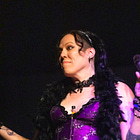
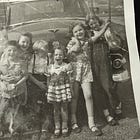
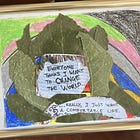

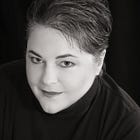
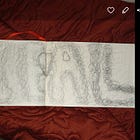

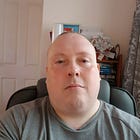
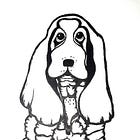
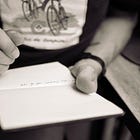

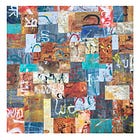
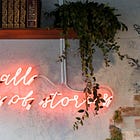

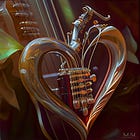

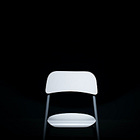
Here is a piece I wrote on expressive art therapy https://open.substack.com/pub/johnmoyermedlpcncc/p/i-stand-accused?r=3p5dh&utm_medium=ios
I am so grateful for your work to gather creatives on this platform and share their work as a kind of ceremonial practice toward healing the world.